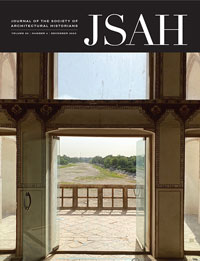Once formidable, now forgotten, the mid 20th-century critic Sibyl Moholy-Nagy merits new attention. Introduction by Despina Stratigakos.
From Places Journal’s introduction to its new series:
Left behind in the Internet era is a rich store of material in print which has limited cultural presence because it has limited digital presence. With this article we are introducing a new series, Future Archive, consisting of the online republication of significant 20th-century writings on design, with each text selected and introduced by a prominent scholar. The series is funded by the Graham Foundation for Advanced Studies in the Fine Arts.
From Despina Stratigakos’s essay on Sibyl Moholy-Nagy:
When Sibyl Moholy-Nagy died, in 1971, Reyner Banham eulogized her as “the most formidable of the group of lady-critics (Jane Jacobs, Ada Louise Huxtable, etc) who kept the U.S. architectural establishment continually on the run during the 50s and 60s.” Yet today it is unquestionably the other two “lady-critics” who continue to be broadly remembered and read, while their “most formidable” peer has faded from view. Perhaps her combative writing style — and ability to land punches — has contributed to that eclipse; where others lauded, she condemned, and her targets included some of modernism’s greatest stars. Whatever the reason, the marginalization of her voice represents a loss in our understanding of the landscape of criticism in postwar America, and how and where the battle lines were drawn in those often tendentious years.
One of the battlefronts is clearly evident in “Hitler’s Revenge,” the essay I have chosen for Future Archive. In this 1968 critique, published in Art in America, Moholy-Nagy responded to what she (and others) viewed as a ludicrous proposal by Marcel Breuer to erect a skyscraper atop Grand Central Terminal in New York City. She begins her review by paraphrasing a famous quip attributed to Walter Cook, founding director of the Institute of Fine Arts at New York University, which saw its faculty greatly enriched by distinguished European scholars fleeing Nazi Germany; Cook boasted that “Hitler is my best friend; he shakes the tree and I collect the apples.” The talent thus harvested by America included Sibyl Moholy-Nagy’s own husband, the multi-faceted artist and Bauhaus-teacher László Moholy-Nagy, who emigrated first to London and then to Chicago, where he founded the New Bauhaus (later School of Design), today a part of the Illinois Institute of Technology.
Read full text including footnotes and links here
Sibyl Moholy-Nagy was an early member of SAH until her death in 1971.
Despina Stratigakos has been an SAH member since 1997.


